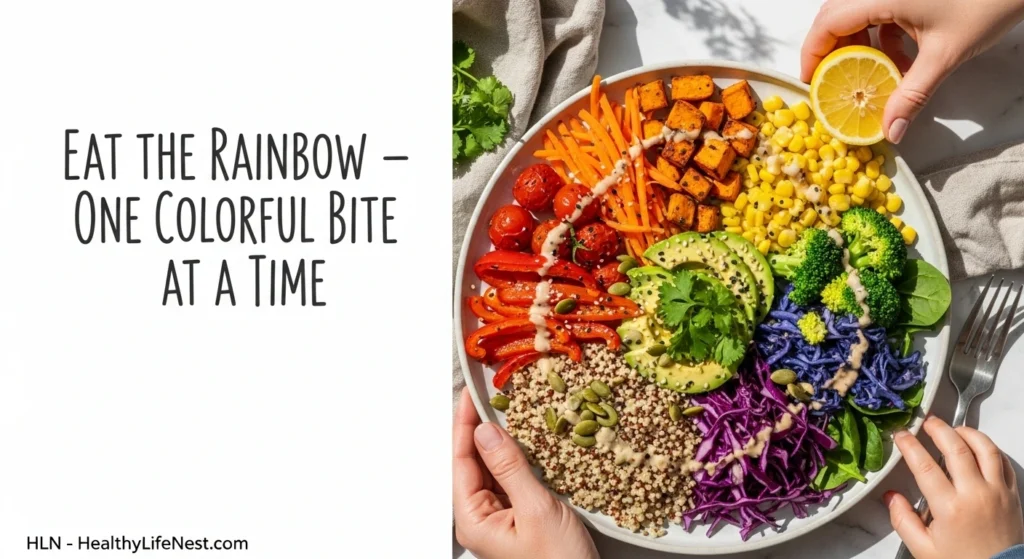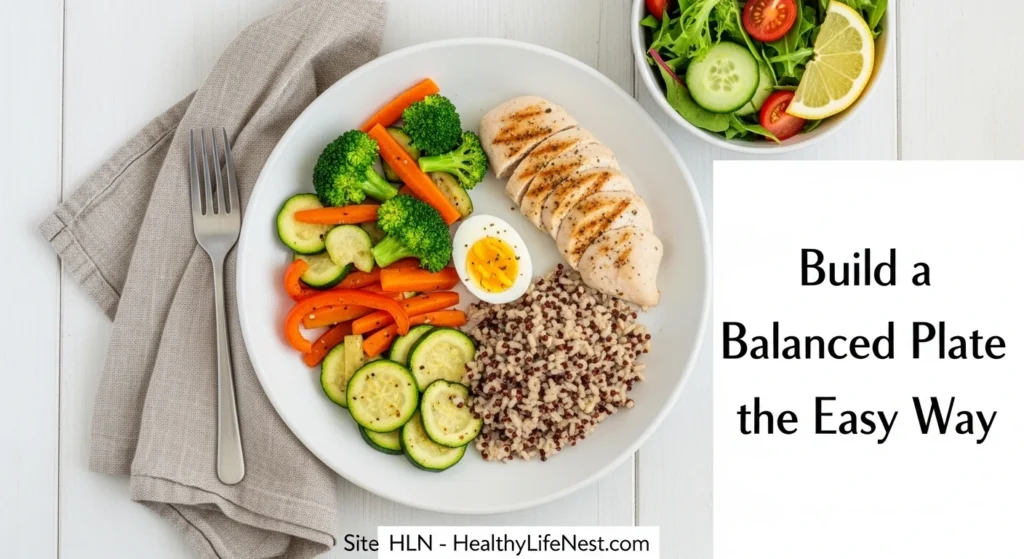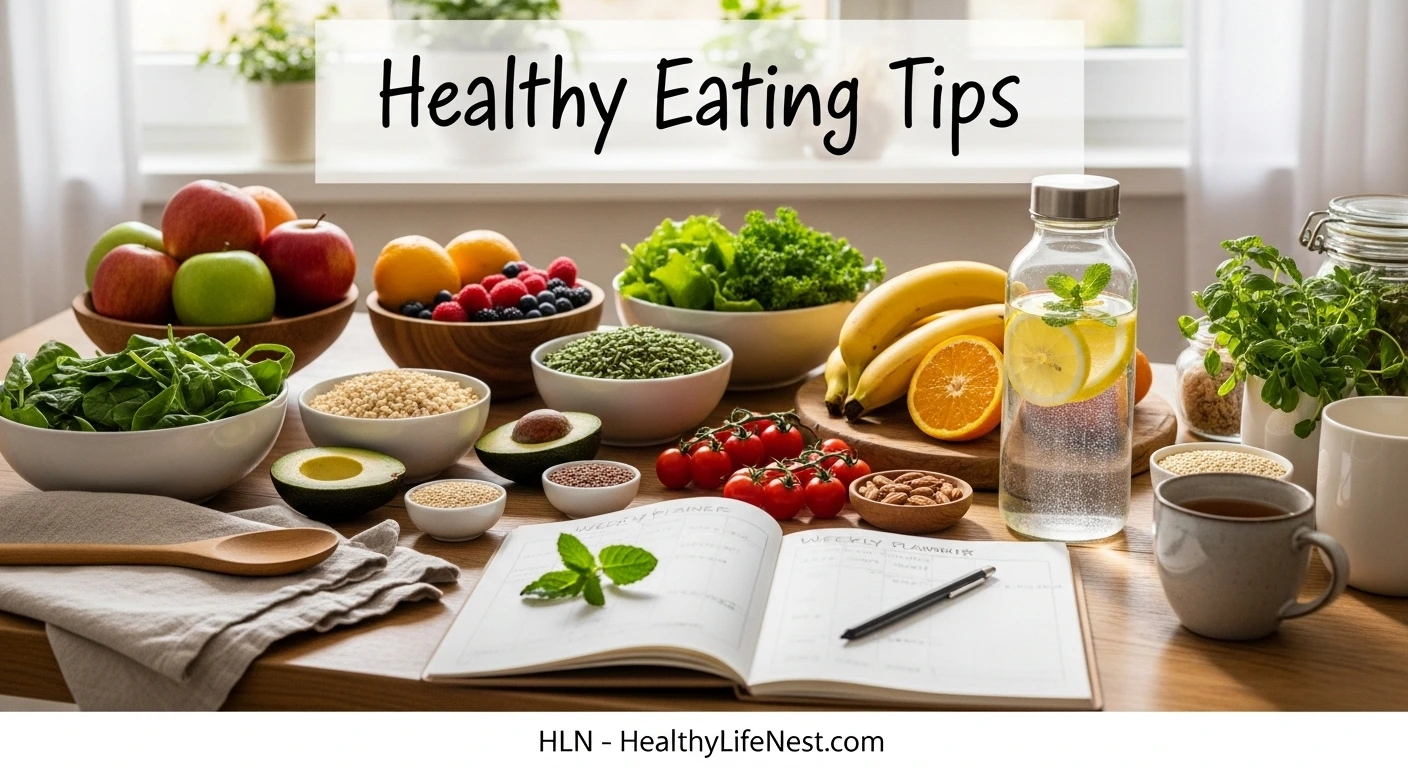Simple Healthy Eating Tips for Daily Life & Wellness
Eating healthy doesn’t have to be complicated. With so many food trends and advice out there, it can feel overwhelming. But the truth is, healthy eating is about balance, variety, and small, consistent choices. Whether you’re just starting or want to refine your habits, here are simple and practical tips to guide you.
1. Start with Real, Whole Foods
The foundation of a healthy diet is whole food—ingredients that are as close to their natural state as possible.
Examples of Whole Foods:
| Category | Examples |
|---|---|
| Fruits | Apples, berries, oranges |
| Vegetables | Broccoli, spinach, bell peppers |
| Proteins | Eggs, beans, lean meats |
| Whole Grains | Brown rice, oats, quinoa |
| Healthy Fats | Avocados, nuts, olive oil |
These foods offer essential nutrients your body needs without added chemicals or sugars.

2. Eat More Color on Your Plate
Colorful meals usually mean more nutrients. Try adding different fruits and vegetables to your meals each day.
Try This:
- Add spinach or arugula to your sandwich
- Mix berries into your breakfast oats
- Roast a mix of sweet potatoes, carrots, and red onions
Eating a rainbow isn’t just pretty—it’s healthy too.

3. Plan Your Meals Ahead
Planning meals for the week can help you avoid impulsive choices and save time and money.
Simple Meal Planning Tips:
- Use a grocery list based on your weekly meals
- Cook in batches (like soup or roasted veggies)
- Keep healthy snacks on hand (nuts, boiled eggs, fruit)
A bit of planning goes a long way toward staying on track.

4. Choose Water Over Sugary Drinks
One of the easiest changes? Drink more water. Sugary drinks like soda and energy drinks are packed with empty calories.
Healthy Drink Swaps:
- Sparkling water with lemon or mint
- Herbal teas (like peppermint or chamomile)
- Smoothies made with fresh fruit and plain yogurt
Staying hydrated helps with digestion, energy, and even skin health.

5. Watch Portion Sizes, Not Just Ingredients
Even healthy foods can lead to weight gain if you eat too much of them. Listen to your body. Eat when you’re hungry, and stop when you’re satisfied—not stuffed.
Helpful Portion Reminders:
- Use smaller plates or bowls
- Fill half your plate with vegetables
- Avoid eating straight from the package
Mindful eating helps prevent overeating.

6. Read Food Labels (But Don’t Stress Over Them)
Ingredients are listed in order of quantity. Look for shorter ingredient lists, and avoid those filled with additives, artificial colors, or sugars ending in “-ose.”
Look Out For:
- Added sugars like high fructose corn syrup
- Trans fats or hydrogenated oils
- Preservatives with long, hard-to-pronounce names
If you don’t recognize something in the ingredients, it might not belong in your body either.

7. Don’t Skip Meals—Especially Breakfast
Breakfast jumpstarts your metabolism and sets the tone for your day. Skipping meals can lead to energy crashes and poor food choices later.
Easy Breakfast Ideas:
- Greek yogurt with berries and granola
- Scrambled eggs with whole grain toast
- Overnight oats with banana and chia seeds
If mornings are hectic, prep the night before.
Read more about.
8. Treats Are Okay—in Moderation
Yes, you can still enjoy your favorite cookies, chips, or desserts. The goal is not perfection but balance.
Tips for Treating Yourself Wisely:
- Keep treats out of sight to avoid temptation
- Share desserts when dining out
- Savor each bite instead of rushing
Healthy eating includes enjoying food, not fearing it.
9. Eat Together When You Can
Meals are about more than just fuel. Eating with family or friends builds connection and encourages better habits—like slower eating and trying new dishes.
Even a simple dinner at the table without distractions makes a difference.
10. Listen to Your Body, Not Just the Trends
What works for one person might not work for another. Some people thrive on three meals a day, others prefer smaller portions more often. Tune in to your own hunger and energy levels.
Your body knows more than the internet sometimes.
Quick Recap: 10 Healthy Eating Habits
- Eat whole, real foods
- Add color to your meals
- Plan your meals in advance
- Drink more water
- Control portion sizes
- Read labels simply
- Don’t skip meals
- Enjoy treats mindfully
- Eat with others
- Follow your own rhythm
Conclusion: One Bite at a Time
Healthy eating is not about rules. It’s about making small, realistic changes that work for you. Start by adding one new habit this week. Over time, those small steps become a lifestyle.







